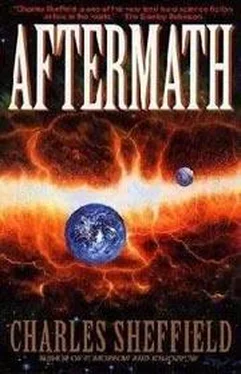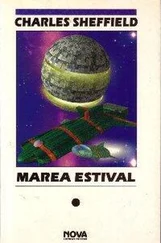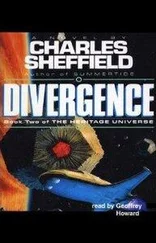“Yes, ma’am. I know you are keen to help. But let me ask you this. You trained for many years before you went to Mars. What would you have said if, the day you left, someone without any training came along and told you they wanted to go along, too? My team has worked together for six years in this type of exercise. We know each other, we trust each other.”
When Celine said nothing, he went on, “And there’s one other reason, ma’am, why we don’t want you along. This one sounds selfish, and maybe it is. But it’s true. You went to Mars and you made it back. You’re a legend. How do you think we’d feel, all of us, if you went along and somehow we got you killed? We’d never get over that.”
Celine admitted defeat. This was supposed to be a neat surgical operation, fast in and fast out, with minimum violence and no casualties. But the Mars expedition had provided the ultimate proof that, plan as you liked, things went wrong.
“Will you do me one favor?” she asked. “I’d like to know what’s going on. Can you show me the controls for the display units?”
“Glad to do that, ma’am.” The captain nodded to one of his companions. The woman came forward and showed how each sensor could be controlled in look direction, focus, magnification, contrast, saturation level, and sensitivity. It was crude, it was cumbersome, and it had to be done manually. With the failure of the chips, none of the old taken-for-granted automatic features worked.
Celine made a practice run. Under her control, the visible wavelength display at maximum sensitivity showed a faint gray ghost of a scene. Outside, dawn was approaching.
Zero hour.
The strike team adjusted their equipment, picked up gas cylinders and projectors, and prepared to leave.
With their black body armor, goggles, helmet communication antennae, and long-muzzled gas masks, they were like strange mutant insects. The captain had a final word with the driver. “Two hours. If we’re not back, or you don’t have radio contact at that time, you’re on your own. Use your best judgment.”
“Yes, sir.” The driver checked his headset.
“Good luck,” Celine added.
“Thank you, ma’am.” The captain fixed his mask in position and slipped quietly out of the open rear of the vehicle.
Celine turned to the display controls. The microwave and thermal infrared channels showed the group snaking their way downhill toward the little schoolroom. As usual, her mind threw off half a dozen questions. What would the strike team do if the elevators were no longer in service? Would Pearl Lazenby, worried about Celine and Wilmer’s escape, have moved her headquarters? What were the chances of an ambush, somewhere belowground? Were Jenny and Reza safe, or had they been sacrificed to atone for their help in the escape? Had they been tortured, to tell whatever they might know? The rules of civilized behavior did not apply to the Legion of Argos. The strike team did not care about Reza and Jenny, their whole focus was on the rapid capture of Pearl Lazenby.
The group reached the school. Celine watched them vanish inside. After that came the frustration of a view with nothing to offer but the gradual brightening of dawn outside the van.
She turned to the driver. “Are they all right?”
He gave the shrug of a man who had been through this sort of thing many times. “So far, so good. They’ve reached the elevators. We may lose radio contact once they go deep underground. Unfortunately, that’s when it gets interesting.”
He was deliberately casual, but Celine noticed that he did not take his eyes off his own monitor. It showed the same scene as hers. But suppose that the Legion of Argos came from some other direction?
She went to the open rear of the van, stepped outside, and looked around. All she saw was a peaceful morning of late spring. She returned to her seat and turned on the television that picked up general broadcasts. Apparently it was too early in the day. The little screen showed nothing but a test pattern.
“A few more minutes.” The driver had observed her actions. “Then we’ll get the channel news.”
Presumably, that would come on the hour. But by then, the strike team would be well on the way to success or failure.
Celine tried to estimate times. Say, five or six minutes to descend. Another five to advance, cautiously, and determine the situation. The neural gas was supposed to make a person unconscious in seconds, quickly enough that there would be no time to use a gun. Then, say, five more minutes to take bearings and hurry along to Pearl Lazenby’s private quarters. Would she be asleep, or awake — or there at all? In any case there would be more gas, followed with luck by a quick retreat carrying her body. Then into the elevator, and back to the surface.
Clean, tidy, efficient. Every task looked like that — until you came to carry it out. Then you discovered dirt, mess, and muddle.
She turned to the driver. “Any word?”
“They’ve left Grossman at the top with a radio. The rest are in the elevator. Don’t worry, he’ll report as soon as there’s anything worth saying — unless he loses contact when they get down there and approach Lazenby’s quarters.”
Which would be the most crucial time. Naturally.
On the television set in front of Celine, the test pattern vanished and was replaced by the Great Seal of the United States. A disembodied voice bade her good morning and informed her that this was America.
But then, of more interest: “. . . the major speech made yesterday evening by the President.”
Celine and the strike force had been on the way here and otherwise engaged. She had asked Wilmer to attend and note what was said, but she didn’t have much hope. Wilmer heard what he wanted to hear. Anyway, he and Dr. Vronsky, along with a dozen other scientists, were too busy playing with semirigid body dynamics and space construction methods to notice much of anything. Celine kept one eye on the external scene monitors and turned most of her attention to the television.
President Saul Steinmetz was standing at a lectern. On the black-and-white image his face was pale and his eyes sat deep in their sockets. Somehow he seemed to have grown taller since her meeting with him, and the familiar voice was firm and commanding.
“This nation and the world have over the past two months been through very difficult times. Supernova Alpha caused tragedy on the largest scale, for which no nation was prepared and from which no nation emerged unscathed. Now everyone, here and through the whole world, faces the enormous problem of rebuilding. I feel sure that it will come as a surprise to most of my fellow citizens, as it did to me, to learn that this country was one of the luckiest ones in terms of the supernova’s effects. But that is true. Our friends abroad were far less fortunate.”
The camera scanned the crowded hall to show the audience of Senators and House members, then returned to the people standing directly behind the President. Celine recognized the new Vice President, Brewster Callaghan. Next to him on his left was the House Minority Leader, Sarah Mander, and on the right the Senate Majority Leader, Nick Lopez. Next to Lopez was the young male aide that Celine had met when she visited the White House. In front of Lopez stood the strikingly beautiful young woman who had accompanied Celine and Wilmer from the State Department to the White House. Yasmin Silvers presented her profile, because her eyes remained fixed on the President.
“A unique tragedy,” Saul Steinmetz was continuing, “which we will certainly never forget. However, tragedy is not our business. Our business is the future. And now it is my duty to deliver a warning to us all. In the future — all our futures — half a century away, lies an event which without action on our part will kill every member of the human race. If humanity is to survive, we must undertake an enterprise of unprecedented size, difficulty, and duration. This Grand Design must be the construction of a vast shield, out in space, which can divert deadly follow-on radiation from Supernova Alpha. In order to build such a shield, the combined resources of the whole globe—”
Читать дальше












